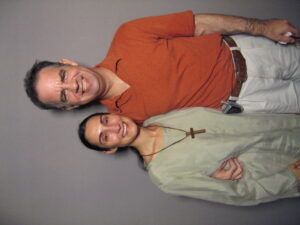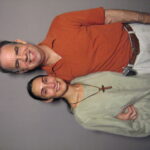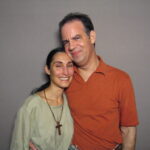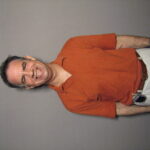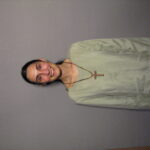Diane Reiners and Brian Nelson
Description
Diane, who coordinated the relief effort at St. Paul’s Chapel across from Ground Zero, talks about the 9/11 relief and recovery effort.Subject Log / Time Code
Participants
- Diane Reiners
- Brian Nelson
Venue / Recording Kit
Tier
Initiatives
Keywords
Subjects
Transcript
StoryCorps uses Google Cloud Speech-to-Text and Natural Language API to provide machine-generated transcripts. Transcripts have not been checked for accuracy and may contain errors. Learn more about our FAQs through our Help Center or do not hesitate to get in touch with us if you have any questions.
00:04 My name is Brian Nelson. I'm 46 its August 18th 2005 where the World Trade Center storybooth and I'm with Diane reiners who's my fiance and pain.
00:16 And I'm Diane reiners and I'm 43. It's August 18th 2005. We're at the story booth at the World Trade Center, and I'm with Brian Nelson my fiance
00:34 So
00:38 Tell me the story of your involvement at Ground Zero. With your first experience.
00:46 I'm on
00:48 September 13th, I got a phone call from somebody at General Theological Seminary who were organizing people at seamen's Church Institute, which was
01:01 With which was on Water Street, which was still within the perimeter at that time. Just pretty far out asking if I could organize some people to come down in a group.
01:14 To help out doing whatever at that point. I wasn't sure what it was and people I was the young adult coordinator at st. John the Divine which is the Episcopal Cathedral Uptown and we had said yes that we would organize a group of people for the overnight shift that night and I got a call back 10 minutes later saying can you just get down there now? Because the people there need relief they had been up since the incident and so I said sure and so I got down there and they passed me through the checkpoint and I got to seamen's Church Institute in at that point. One person was cooking on a gas grill on the roof and there was a woman named Meg who is cooking with a gas stove. There was no electricity and there were hundreds of people just Milling about and they were organizing kind of makeshift canteen.
02:13 And it was kind of a mess and they had water called proofers which are kind of makeshift ovens. And because I'd worked for a catering company and I'd worked as a chef. I was very familiar with the equipment and so I went upstairs and everyone was very exhausted and I said right I can do this and so I started to organize the provers and tell people how to keep them going and what how to best organize the food and somebody at Siemens came over to me and said great you're here I can go to bed. And so I ran the kitchen for the overnight shift and on September 13th into the morning of September 14th actually into
03:04 The early afternoon of September 14th and by then the people from semen to come back and somebody said asked me if I could come back again later that night and do the same thing. And so I became the de facto overnight chef and
03:26 By the next night, we had already started cooking food outside of st. Paul's Chapel, which is on Broadway and church. No one was inside The Chapel at the time. They had fashion. Somebody had fashion during the day open steel drums. And so we were barbecuing hamburgers and we were cooking at Siemens and ferrying food and at this point supplies hard hats and dumb.
03:56 Flashlights and
03:59 Spades and food and masks over to tents outside Saint Paul's Chapel. And so I went back and forth and then
04:16 That I'm going to say about a week and a half later Siemens was starting to close down because the perimeter was moving further and further inside and at Saint Paul's Chapel at this point. We were making what we're called runs Red Bull supplied a lot of product. I hope that's not too bad that pitching but they did we ran on Red Bull and Snickers for at least the first three weeks and we would take bucket up into what then was a huge pile almost like a small Mountain.
04:58 As rescue workers were still looking for survivors and we would take buckets of food up to them. And at one point somebody had allowed to very young not even 16 year old girls in.
05:14 Just regular street clothes to go out separately in the pile. So when I when one of them had come back I quit. I made it a question to the Des said the decision and I said right no more young girls going out into the pile. They have to stay behind the tents and no one's going out into the pile by themselves were only going out in pairs and I'm someone said well who's in charge and I said, well, right. I'm in charge because at that point on the overnight shift, there was nobody in charge. So after a while I was the person in charge.
05:52 What were the tents?
05:54 The tents on the Thursday
05:57 It poured so it just literally it didn't get absolutely poured rain. And so
06:08 Necessity is the mother of invention and the supply started to get wet. So all of a sudden plastic came out of nowhere and on broom handles and
06:24 With string and tape we taped up tents to keep everything dry outside and by Friday the 10th became a little bit more permanent. One of the things that was the most amazing and you know this from having been down there yourself that
06:44 Almost like the apocryphal Loaves and Fishes. You never need it for anything. If you needed something you turned around it almost miraculously happened. So I don't really know where the plastic came from to make the 10th, but it started to pour and all of a sudden there. We were putting up tent it was just what it happened and there were people handing out ring gear and
07:13 I I remember just standing around in a chef's apron handing reindeer out and at the time my friends Ron and Sally were helping to put tents up and it didn't take it took about two hours in the tent stayed up probably.
07:33 For two weeks seamen's Church Institute officially closed down there part of the operation and it moved entirely to St. Paul's Chapel and what started on the front we had food a food operation on the front and Supplies on the side of the chapel when at one point. Nobody was sure if the building next door was actually going to stay standing.
08:04 No one was really sure what was going to stay up. So the pastor of the chapel made sure the guys from OSHA came in and checked to make sure that everything inside the chapel was okay. So eventually everything moved inside the food stayed outside for a few months, but all the other supplies medical supplies and other services went inside and all the beds went inside.
08:32 Shoot you just give me back up a little just give a description of where you were and what you were doing there. I mean we were working at a tent that was by the site just it just a three-sentence explanation of what the setup was here.
08:55 It was everything from it was everything from cooking food to handing out supplies. And basically I was making sure that as volunteer Loops came in that the volunteers.
09:13 Were organized that the physical location is right on the edge of the site right now south on the north east corner on the north east corner. It's physically on church and Vesey. So right now we're at the World Trade Center and we're in the PATH station. So if we you walked upstairs and turned around you'd be looking in the cemetery and the tents ran right along the front of the cemetery so front this and yes the church, where was the cooking at the front of the chapel, which is on the Broadway side underneath it right on the actual porch.
10:10 And the supplies will put the supplies were along Church Street.
10:17 And along
10:24 It's not VC. What's the Fulton and Fulton? Thank you. So the supplies rental on Fulton and on Church Street next to the is in the cemetery because we'll the first couple days at the cemetery was still full of paper. We waited through literally it was knee-deep. That was the one of the things that still strikes me as is.
10:53 Erie other than that great big Shard building that everybody noticed that was almost almost like art that just jetted out was the amount of paper.
11:09 Everywhere everywhere. I mean it just literally me deep cemetery is is
11:18 One of the oldest is is the oldest cemetery in Manhattan and
11:25 It was other than a few headstones that we're broken was untouched. But in the trees there were blinds from the buildings that were all twisted into the into the tops of the trees one tree was blown over and just
11:44 We just waited through massive amounts of paper and and just the gray Ash. That was everywhere that just breathe.
11:57 I don't remember it being particularly hard to breathe but
12:03 I breathed out black suit for months and months after.
12:12 It's what for years later and then
12:16 As you know, I just opened up a box and I still didn't end and I opened up a few boxes of some of the stuff that we had left from the relief effort. And today I can still taste it in my mouth from what was left.
12:36 But then I don't.
12:38 It's it's ocean potion told us to wear gas masks all the time, but no one ever did so it's not that it I mean, I think that's psychically a bothered us the idea of what we were breathing in and and that it was
12:57 Just everywhere and end the smell we would get it when I came home. I would take off as much of my clothes and leave them outside. My door as I could smell like.
13:15 It's very difficult to describe.
13:23 A kind of
13:26 A kind of
13:29 Charred rubber
13:34 But but something else too.
13:38 I I've never been on a construction site before but
13:44 But the Char was
13:47 Just it was just an unmistakable thing and
13:54 And it just permeated everything. Literally we were breathing it out all the time. We just couldn't use couldn't get rid of it. And it coded. It's like code in the back of our tongue. That's what I can feel now just from opening up a couple boxes of stuff that I had left off to you so that you were in charge.
14:18 What did you do?
14:25 I am
14:30 I started making lists of of
14:36 Very specific sings. I I we set up another person Andrea and I I sort of solicited her help and said great now, you know now we have some sort of, you know, we have two the two of us and we're going to set up some sort of structure right now to to you know,
14:58 Just to have some structure. So we said this table is going to be this in this is going to be dust in this is going to be that and there were there were people we made sure that all the hard hats were in one place in the gas masks were in one place and
15:16 These were under the tent cities were under the tent and there were there actually were people from Trinity Church who oversees st. Paul's Chapel who were in charge during the day but on the overnight shift,
15:29 There they were not to be seen because they were all I think trying to figure out look the legal logistic of how to run this and there was also the issue of food safety on the Honda Friday the food safety inspectors came by to tell us that that are hamburgers or at the right temperature and that we would actually have to either stop cooking food or we would have to have a food safety inspector there and fruit wasn't properly wrapped. It was just absurd then police officers came and asked the food safety inspectors to leave because they said it was a crime scene and it became actually a pretty big to do. It was just a monstrous absurdity, but
16:27 Well, they at they did ask the food inspectors to leave at least three or four times, but eventually somebody was brought on board to you know to make sure that we complied we tried to comply as best we could do, you know, we had pieces of plastic wrap and we had volunteers wrapping apples and and that was as close as we could come. It actually didn't take that long to try and organize and then Trinity brought in a group called Labor of Love to actually be the organizing.
17:07 Structure and they
17:12 Came in and that's when as you know Catherine came and they came in and they actually didn't last that long only because the person who ran labor of love made a big Miss dep there shortly after that Trinity started to pay me. They said, you know, we would like you to fit to officially come on board and
17:36 They started paying me in October and
17:49 Dude
17:50 In October, we still had food out front. We still had.
17:56 But it was a little bit more organized.
17:59 And by the time it is moved inside we had the volunteers were more organized. Although they were organized at the beginning volunteers came in two ships original the general Theological Seminary Mary who had called me. They had organised shifts for the first few weeks. And then at the chapel, we just took over scheduling. I don't I have no idea how many phone calls in a day I would get or Catherine would get but
18:34 We had to turn a lot of people away because people just kept calling saying can we have a shift and we had a book and his people would call we just filled up. I think we filled up three months in advance the first time for two ships a day and we took groups and then we took a few singles two shifts every 24 hours. And so inside we had supplies which changed with the need one of the most I think profound moments was the day that we noticed that it went from being.
19:17 Rescue to recovery which which happened I think.
19:25 2 days before they made the official announcement and we noticed it on the site because they pulled all the EMS trucks off.
19:34 Are you on the side?
19:38 At that point. Yeah, because the 10th at that point we were still running buckets. Yes.
19:51 At that point the site was open and and we still
19:56 It went from Rescue to recovery fairly early on I think it was just a few weeks.
20:06 Running buckets of water and Redbull and Snickers and
20:16 Because
20:18 Workers had been
20:22 Up all night. They were still looking for survivors.
20:29 Oh the blank one of the buckets. I'm sorry. The buckets were bought buckets of bottles. It was drinking water. It was because people on the side once and even once they had pulled off the volunteer.
20:48 Sergers even the people who were paid Searchers didn't necessarily leave they would stay there. They would sleep won't really eating. So basically the job was kind of taking care of them. It became a
21:06 Just an eerie kind of world and their became a kind of signal. They they knew us. I mean you'd walked by with a bucket and somebody would would flag you and they would almost be like a symbol for Red Bull. It wasn't it was quiet. It was for the first few weeks. There was a big silence because the construction machines hadn't been on it was all done by hand and nobody really spoke but it was a very kind of symbolic, you know water Red Bull hand signs. Thank you. You're welcome kind of thing and
21:51 It was just a very different feeling than it was later on. I don't necessarily think it was.
21:58 More profound it was certainly a more hero it.
22:03 Kind of feeling
22:07 We were up it was I got very little sleep in the beginning.
22:15 I would literally go home sleep for 5 hours turn around and go back.
22:24 The pain from bringing supplies to the people on the side.
22:32 Organizing the volunteers who came down.
22:37 Telling them or what to do. I'm trying to figure out what we needed and trying to figure out how to get what we needed.
22:49 Bottles of water
22:53 Chocolate was a huge thing at the beginning eyedrops were big.
23:02 I'm trying to think what was important at the beginning we kept running out of hard hats gas masks until OSHA came in and regulated. They measured us for sizes eventually boots at the very beginning because they would melt off people's feet. So Timberland kept donating boots. I don't know how many pairs of boots and it was a hot item. So stalking them and almost like a mini shoe store socks will both it was hot on this and that it was also really hot on inside two.
23:40 Rescue workers went through boots really quickly.
23:45 Gloves
23:48 Items of clothing at the very beginning went very quickly things that we socks. Yeah, many socks things that we thought would go that would be an issue. I think there's probably that are probably still buried somewhere at st. Paul's things like Band-Aids and medical supplies were never needed.
24:11 Other things that we never thought would be an issue fix because of the smell we kept running out of
24:20 Foot insoles shoe insoles. I don't think we ever had enough in stock.
24:27 Hand lotion with a thing that went very quickly.
24:35 Okay, so you organized the volunteers and the supplies they moved into St. Paul's?
24:44 And in my temples, can you describe that happen at the beginning or later on? I mean it's a federal is chapel and at the very beginning it was just tables of supplies. But at one point and I don't really know when it happened that it was during a day shift, but I came in and somebody had taped up a sign just across from the first table when you walk into the chapel on the left at the first table was what we called the meet-and-greet table and it was where whoever the coordinator was sat either mayor Catherine Wood said and we would be on the phone and that's where the sign-in book would be and it would be the first place that a relief worker which was anyone which was a police officer or the sanitation workers are construction workers. Really anybody who was on site would come in the door.
25:44 And that's the place where they could if they had a knee that they wanted to ask for. They could always ask somebody up front if they had a question if they were going to go to sleep and they needed a wake-up call or if they had a specific if they said look up I'd really need a pair of boots. That's what you would be the person who would go find them and then there wasn't table next to that that had clothing supplies. Mostly that started off being hard hats. But as the months got colder and ended up being winter supplies and then is the months got warmer. It ended up being, you know t-shirt to stay with sweat through different things and then further down was a table with some mostly candy it initially.
26:32 Candy was very popular. Then there was a sort of coffee station. There was some and then all across the back was food.
26:42 Then on the other side there were services that we had massage therapists 24 hours a day. We had the diet of podiatrists and we had chiropractors. Also a big part of our day was the fact that we had a service every single day at noon.
27:02 And that started fairly early on that kept all of us there working grounded. So I came in one day in October and somebody had put a sign up across pretty early in October 7th. You put a sign across the first table and after that sign went up somebody else started to take little cards and letters around that sign and from those little cards and letters every time one of us would come in at it would just grow and grow and grow until it didn't take long maybe a week until the chapel was just covered because I'm the letters that have come to the mayor's office or Two Bunch came to New York tears came to Firehouse has police officers would come in and just dump boxes of letters and volunteers would take them up and it just became a riot.
28:01 Of letters from well-wishers from children from people across the country from even I remember Christmas cards from Guam and they were everywhere. It was just quite an extraordinary thing to look at.
28:23 And
28:26 I don't think anyone left on touched.
28:29 And then
28:32 There was a construction worker named Tom Garrity whose sister-in-law was in one of the towers and she died and he had a button with her picture on it.
28:48 Banks
28:50 And he put it on one of the small altars to the left of the chapel and he used to touch it when he came in and out soon after that. Someone else came in with a picture of somebody that they had lost it and asked if we would just put it somewhere in the chapel and we thought well and I will put it with Tom sister and from That Grew this altar that we called the memorial altar after that that was sort of another online.
29:27 I don't know how to describe it was as riotous as the cards and letters but much more sacred and
29:35 It's just where people would.
29:49 And it just became packed.
29:57 It was to the left of the entrance. Yeah, yeah.
30:07 It's still at isn't it? I think so. No, but the same bitches. I don't know. I think Tom Dick is batten down payment to the Relief Center.
30:22 The workers anybody who worked on the side at the beginning it was
30:35 It was on anybody who was working on this site.
30:43 Construction workers sanitation workers police officers the National Guard Sanctuary there were a lot of work there not a lot of release centers on the site. They were probably I think there were a bunch at the beginning by the end. There was a Salvation Army tent called the Taj Mahal, but st. Paul's Chapel was more of a sanctuary. It was the one that was a church in the fuses and and yep, and there was something very sacred about Saint Paul's Chapel.
31:24 Tell me you used to greet the 12-hour shifts. Speech. Can you give us a little bit of your speech?
31:42 You would introduce I think that's hard cuz I think it would be long that I would just say, you know, welcome to st. Paul's Chapel and thank you so much for being here on that.
31:56 You
32:02 Adam
32:05 No one leaves this place time change.
32:17 That it changes me everyday. I'm amazed everyday that I'm here. It's such a privilege everyday to walk in that store.
32:29 I've learned over the 9 months that
32:34 People are amazing.
32:42 And I suppose the one thing.
32:47 Is that
32:50 Then I got to see the best of people.
32:59 Although over the nine months. I learned that if even give people autonomy and let them do.
33:10 Whatever they're going to do to be good. Even at the point where I was kicking and screaming and thought they can't possibly be doing that and just being really harsh.
33:24 That if I would let go and let them do things would always get done and
33:33 That
33:36 That people would leave.
33:40 Changed because they owned the experience.
33:45 And they did a better job than I could ever have done. I mean
33:51 I'm blessed to have been in charge if I think I was only in charge because I'm bullheaded. I would say Welcome to our chaotic Hotel of radical hospitality.
34:14 And it really was.
34:19 Wow.
34:23 It has
34:28 Put an entirely different a focus. It's allowed me to be the person that I really
34:38 Wannabe
34:44 I don't know how to say that but it's allowed me to be a person who's going to who will live my life service oriented.
34:54 My career my time my focus is
35:02 All service-oriented before it was something I did as
35:08 A hobby, it's also changed the way that I look at people.
35:15 Am I the people that I volunteered with were not the circle of people that?
35:23 I don't know who were my inner circle and I found that.
35:29 Has some of the crazier
35:32 Out there
35:34 People that I wouldn't have expected turn out to be the most magical the most giving
35:44 And the most surprising
35:49 What white what was your employment at the time that you were in town? I was an actor.
35:58 I'm in discernment.
36:02 So
36:04 I'm spending time sitting trying to figure out with my Parish weather.
36:11 Or not the ordination process is where I should be looking or whether I should be looking somewhere else, but I know that it will be service-oriented and I know it will be within the church.
36:27 An actor know what time and then how did that transfer into your involvement?
36:33 I was I was an actor.
36:38 As a profession and I always did volunteer work and when I was working at st. Paul's Chapel, actually the day that Trinity asked me at to come onboard I realized and I thought I actually called you and I said, oh my God, I can beat that I can get paid for doing this. It had never occurred to me that I could get paid for something that I would gladly have done as a volunteer. He's like getting paid to run Special Olympics.
37:17 Which is something that I also do and I was an actor even then and halfway through while I was working at Saint Paul's Chapel. I I did a play very briefly and I realized in the middle of it that I would rather have been.
37:41 Working an overnight shift at st. Paul's then doing a play and
37:47 And I had been
37:49 Leading away from it. I've been an actor my whole life from the time. I was a child and
37:56 And it's a great craft. It's just not the person who I am.
38:07 The one thing that everybody used to say
38:10 Was that Diane was the spiritual center of the relief effort?
38:15 And they would say at constant pain. I know they will cost but I would be sitting in the meet-and-greet table and they would know that I was your pain and they understood that from your speeches for the volunteer.
38:31 I became in all the other speeches came from you all speech all the other Spirit of the whole place came from your house.
38:39 And that although you felt you a bullheaded and that divided the draw the line on things by Teddybears. But which in fact you were wrong on Infected time. Right?
38:49 Your absence emanated throughout the volunteer epic because you influenced everybody else in the spirit that you bring to a service.
39:00 And that was significant for me as a volunteer.
39:04 Everybody else. Thanks.
39:08 Anyway, so
39:13 I clicked on I suppose that we only have two minutes. So I was just going to say do you have a story about somebody that you like to talk?
39:26 But I think the most important thing.
39:32 Is that
39:34 Thank you for saying that.
39:37 Which is very sweet, but
39:41 The biggest thing is that the relief effort with so many people we had over 14,000 volunteers. I don't know how many of the Red Cross but
40:00 Every
40:02 The entire effort was because 14,000 people and countless hundreds of thousands of people who sent cards and letters and donations of love from everywhere. That's really what made up this.
40:20 Perfect Community really was a perfect community of a kind of reciprocity of kindness of a volunteer giving something to a relief worker who would in turn give something back to a volunteer the sanitation workers who?
40:38 Who brought us pallets of water when we needed them?
40:44 Mary and the construction worker bringing in bags of lemons 40 when we needed it them.
40:51 Everybody giving
40:53 The gifts that they could give the gifts that they had and everybody else accepting the gifts that other people were bringing without question without prejudice without any kind of wall. It was that kind of perfect Community created by so many thousands of people that was real lesson for me.
41:23 Nothing that I did.
41:27 Now
41:29 Nothing at all.
41:32 They inspired me.
41:38 Thanks.
41:40 All the place Monopoly
41:45 Location where I can find in you, I was your apartment that would come up to me and to take you better. Look out for a few this giant 400lb man threatening me.
